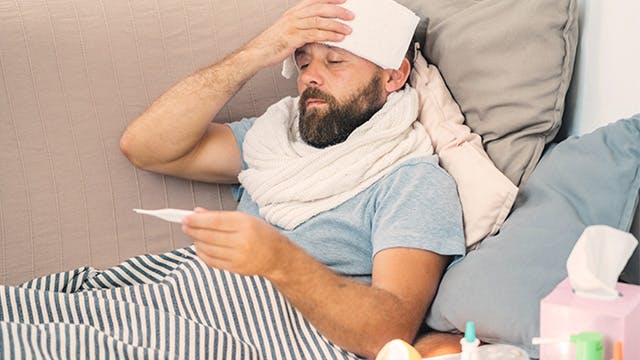Eat Right and Move More
Following a healthy diet that’s high in fruits and vegetables along with establishing a regular exercise routine will help boost your immune system, leaving your body more capable of fighting off bacteria and germs that can cause colds and the flu. Physical activity, whether you choose running, walking, or any other form of exercise that gets your heart pumping, may help push bacteria out of your lungs, reducing your chances of getting sick. Filling your plate with healthy foods like broccoli, kale, oranges, bananas, and more ensures you’re getting the vitamins and nutrients you need to help strengthen your immune system to fight against any potential infections.
Get Enough Sleep
Lack of sleep has been shown to negatively impact your immune system, and this can leave you more susceptible to colds and the flu. Research published in the European Journal of Physiology found that consistent sleep deprivation (i.e. always feeling like you’re running on empty throughout the day) can cause inflammation in the body as well as immunodeficiency, putting your body in a compromising position when it comes to fighting off germs and bacteria.
Aim for seven to eight hours a night of sleep to keep your immune system sharp. If you already have a cold or the flu, sleep is even more important. Help yourself get a good night’s rest with Theraflu Nighttime Multi-Symptom Severe Cold Hot Liquid Powder, which helps you rest easy as medicines go to work on your cold and flu symptoms.

Lack of sleep has been shown to negatively impact your immune system, and this can leave you more susceptible to colds and the flu.
Wash Your Hands
Washing your hands is one of the best ways to prevent getting sick and to stop the spread of germs from person to person.3 We recommend washing your hands with soap and water for at least 20 seconds before rinsing to get completely clean. Humming the tune to “Happy Birthday” to yourself twice while scrubbing is an easy way to ensure that you are washing your hands for the appropriate amount of time. If you don’t have soap and water on hand, try using an alcohol-based hand sanitizer that’s made with at least 60% alcohol instead. Just rub your hands together with the sanitizer for the amount of time you would spend washing them.4
Stop the Spread
Avoiding contact with others who are sick is one of the easiest ways of keeping yourself healthy, and trying to self-isolate if you get sick ensures that you won’t accidentally spread the flu/cold to your peers. If available, try to work from home or take the day off when you’re sick. Your coworkers and your body will appreciate it! Additionally, be sure to cover your mouth and nose while coughing or sneezing to protect those around you. Many illnesses that attack the upper respiratory system are spread via coughing and sneezing, so covering your mouth is the best way to do your part to keep everyone healthy.5
Stress Less
Stress can do a number on both your mental health and your physical health. Research published in Psychosomatic Medicine suggests that higher levels of stress were associated with greater symptom severity in subjects dealing with upper respiratory infections. Everyone reacts to stress differently, and certain individuals may be able to cope with stress better than others. Regardless of how you deal with stressful events at home and at work, it’s important to practice self-care in the form of yoga, meditation, reading, or any other activity that helps you unwind, deal with daily stressors, and keep your immune system in tip-top shape!
Regardless of how you deal with stressful events at home and at work, it’s important to practice self-care.

Get Your Annual Flu Vaccine
The CDC recommends that everyone over the age of six months receives the flu vaccine before every flu season (with rare exceptions – visit the CDC website for more information). Even though the effectiveness of the flu vaccine varies each season depending on the “match” between the viruses in circulation and the viruses in the vaccine, the flu vaccine is still your best defense against the flu and flu related health complications.
Some individuals who receive the vaccine still get sick with the flu, but several studies show that the flu vaccine not only prevents, but reduces, the severity of symptoms in people who receive the vaccine and still get sick. A study in 2017 showed that the flu vaccine reduced intensive care unit admissions and length of stay, overall duration of hospitalization of patients with the flu, and overall deaths caused by the flu.6



